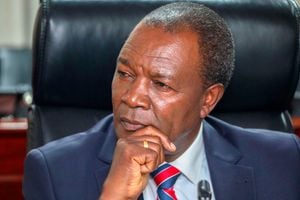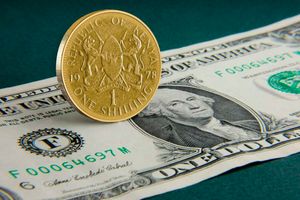
Former Treasury Cabinet Secretary Prof Njuguna Ndung'u displays the Budget briefcase ahead of his speech in parliament in Nairobi, Kenya.
To his last day as the Cabinet Secretary for National Treasury and Economic Planning, Professor Njuguna Ndung’u would sound more like an aloof lecturer in an Economics class, and less like a hands-on policymaker whose fingers were on the country’s purse strings.
He would dish out one esoteric theory after another to drive his point home. He believed in the power of the Market, and less in that of the State, to drive up productivity. On many occasions, he would try as much as he could to rub off that passion to his colleagues in government.
He understood that many people, including his successor John Mbadi, did not understand his language.
“I will be leaving these notes behind because, my dear friend, any time you have any problem with my language, you can always ask me,” he told Mr Mbadi during the handover ceremony.
“For those who have been unfortunate to be in class, they know the language that I talk,” he added.
Although Prof Ndung’u, the former Central Bank of Kenya (CBK) Governor, had a good grasp of economic issues and seemed to have diagnosed well what ailed the economy, he seemed helpless in the face of insurmountable challenges facing the nation.
The economy was battling its latest external shock, the War in Ukraine. It had barely recovered from the adverse effects of the Covid-19 pandemic and a crippling drought. Deputy President Rigathi Gachagua would talk about how the Kenya Kwanza administration had found empty coffers at the Treasury.
Debt obligations, including the payment of a $2 billion Eurobond, amidst a tight global financial market, gave the new administration sleepless nights. The revenues were anaemic, barely enough to pay interest on debt and salaries.
Prof Ndung’u was left with the unenviable task of dealing with this quagmire.
But first, he had to reconcile the theories he had championed while outside government, including the idea that higher tax rates do not necessarily yield higher revenue, with the present need to avert a liquidity crunch.
As his parting shot has shown, Prof Ndung’u made little progress on the idea that lower-tax-rates-equals-higher-tax-revenue.
Obscurity
And so like a centenarian, whose usefulness on earth was fast melting into obscurity, Prof Ndung’u nostalgically retreated to his previous scholarly works.
His tone always remained professorial, albeit with a little sprinkle of academic impudence for effect. He skilfully skirted controversial topics, preferring to watch on TV, like other Kenyans as his juniors in the Treasury and the Kenya Revenue Authority (KRA) were roasted over some controversial clauses in the Finance Bill, 2024.
That Finance Bill 2024 would trigger his waterloo. Following violent protests against the proposed tax law — which sought, among others, to introduce motor vehicle tax, value added tax on bread, and increase excise duty on mobile money transactions and airtime — President William Ruto was forced to reject the Finance Bill, 2024.
He also sent nearly all of his Cabinet Secretaries home. And when Dr Ruto returned some of them to his broad-based government, the good professor was not among the lucky returnees.
He was to vacate his corner office at the Treasury Building for Mr Mbadi, who was until then a nominated MP for the opposition party, the Orange Democratic Movement (ODM).
As he handed over to Mr Mbadi, Prof Ndung’u coyly laid bare his frustrations, noting that the National Treasury struggled to stabilise the economy due to layers of persistent negative shocks.
He added: “There were also inconsistencies in terms of internal politics.”
He did not explain what these inconsistencies were. But at the beginning of its reign in late 2022, the Kenya Kwanza administration had been like a Tower of Babel. When he came to power, President William Ruto preferred a governance system in which he relied on a gang of powerful economic advisors domiciled at State House.
This group of economic advisors, a kitchen cabinet of about seven individuals whose public face has been the vocal economist Dr David Ndii, has had an outsized role in shaping the country’s economic policies in the last two years.
Joined recently by the former Treasury Cabinet Secretary Henry Rotich, this team is said to be highly influential in policy-making. And yet they answer to only one person: The President.
Although Dr Ndii — a straight shooter and a regular figure on social media — has never publicly crossed paths with Prof Ndung’u, he would occasionally clash with other government officials.
For example, when the energy regulator raised the prices of electricity and Dr Ndii tried to justify the increase by chiding the middle-class individuals for complaining yet they spend more on streaming services and satellite television than power, Deputy President Gachagua lashed back, describing his statements as “insensitive.”
“David Ndii is an adviser to the President; he doesn’t pronounce policy. Public policy is pronounced by the President, the Deputy President and the respective Cabinet Secretary,” said Mr Gachagua on electricity prices.
“If that pronouncement came from the CS Davis Chirchir (then CS for Energy), I will be able to talk about it,” added the DP.
Higher tax rates
In his handover speech, Prof Ndung’u also alluded to some external forces that seemed to be pushing for higher tax rates.
He told his successor that one of the ways the country could increase tax as a percentage of gross domestic product (GDP) “is to run away from this notion that high tax rates will raise high tax revenue,” he said.
“The reality is the opposite. I don’t want to mention who drives us there,” said Prof Ndung’u on Monday.
When asked to reveal who was pushing for higher tax rates, Prof Ndung’u told this writer in a WhatsApp message that he got it wrong.
“I have been driving the fact that high tax rates will not produce high tax revenues. That is why I embarked on tax policy review supported by the Danish Government,” he added.
In the Finance Act, 2018, the former administration of President Uhuru Kenyatta increased the excise tax on money transfer services by banks from 10 per cent to 20 per cent, on telephone services (airtime) from 10 per cent to 15 per cent, and on mobile phone-based financial transactions from 10 per cent to 12 per cent. The Act also introduced a 15 per cent excise tax on internet data services and fixed-line telephone services.
Prof Ndung’u was not pleased. Thus, in August 2019 he wrote a policy brief arguing that increasing excise duty on mobile phone airtime and financial transactions may not expand the tax base.
“A higher tax rate on low-level retail electronic transactions mostly levied on low-income earners that are sensitive to transaction costs may discourage the use of mobile phone-based transactions, incentivising them to revert to cash transactions to evade taxes and so less tax revenue,” Prof Ndung’u wrote in the policy brief.
When President Ruto made him the CS in late 2022, only excise duty on fees charged for money transfer services by cellular phone was raised from 12 to 15 per cent.
However, excise duty on telephone and internet data services and fees charged for money transfer services by banks were reduced from 20 to 15 per cent.
Prof Ndung’u — a proponent of the Laffer’s curve, which postulates that tax collections drop when rates go up — had scored. His economic theories were having sway.
Finance Bill, 2024
But the shocker, which seemed to show that Prof Ndung’u was retreating on his philosophy, came in the Finance Bill, 2024, as all these duties were pushed up to 20 per cent, raising an uproar that culminated in the rejection of the entire proposed law and the axing of the former economics lecturer.
Prof Ndung’u has not revealed where he will land next. He might return to the African Economic Research Consortium (AERC) where he was the director of training before he joined Treasury.
He might not enjoy as many perks as he did when he was the CS, but he will have peace.
Less than three months into office, there were whispers that the good professor wanted to throw in the towel as the CS for Treasury. Of course, that never came to pass.
But the economics professor could not hide his frustrations, especially at the media. He dismissed most business journalists critical of the government as either ignorant or pessimistic. Most of the time, he chose not to respond to queries, fearing that he would be quoted out of context.
What was clear with Prof Ndung’u is that he found the politics around a little nauseating. He was not a sycophant and rarely invoked the name of the President in his speeches.
At CBK, where he once served as the governor, an apolitical Prof Ndung’u was slightly shielded from the bare-knuckle politics that tends to buffet Treasury mandarins. CBK enjoys a certain degree of autonomy in its functioning.
Additionally, when he was the CBK Governor, the government was headed by the late President Mwai Kibaki, a level-headed economist who was not very adept at playing politics with the economy.
If anything, Mr Kibaki shared Prof Ndung’u’s laissez-faire spirit. Like Njuguna, Kibaki believed in deregulation and the private sector as the engines of growth.
Things were different in the corner office at the Treasury Building. Here was a hot seat where most of its occupants left in disgrace.










